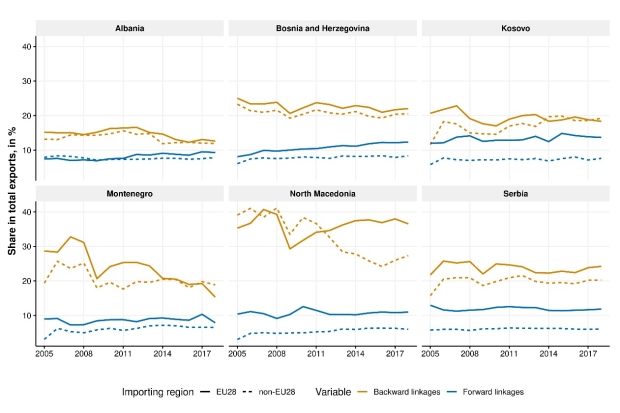SAAs have driven Western Balkan integration into EU and global value chains
18 March 2021
A new wiiw study quantifies the Western Balkans’ integration into global value chains, estimates EU integration effects and outlines policy options for the post-COVID-19 period.
By Robert Stehrer and Oliver Reiter
Photo: 'Eu flag inside a spiral',
European Parliament/Pietro Naj-Oleari, CC-BY-NC-ND 2.0
In the just released wiiw Policy Note, wiiw Scientific Director Robert Stehrer and wiiw Economist Oliver Reiter use a multi-country Input-Output Database (‘wiiw MC IOD’) to study the participation of the six Western Balkan countries in global value chains and to estimate the economic effects of various forms of EU integration.
Their main conclusions are:
- EU membership for EU-CEECs and Stabilisation and Association Agreements (SAAs) for the Western Balkan countries promote exports and global value chain integration.
- Results of this study point towards particularly strong effects for ‘forward integration’, suggesting that Western Balkan exports are widely used in the production process of other countries, including in the EU.
- The study is an additional piece of evidence suggesting that international efforts should focus on economic integration with the EU.
- Further integration steps should include joining the EU Customs Union and expanding the existing SAAs, implying greater access to the EU budget. However, full EU accession should remain the final goal.
- The assistance promised by the EU in the new accession process should be processed as quickly as possible to keep the region committed to further EU integration.
All six Western Balkan economies substantially increased their exports over the period observed (2005-2018), and their trade linkages are stronger with the EU28 countries than with non-EU countries. Montenegro more than doubled its exports and Kosovo’s rose by a factor of five.
Using a multi-country Input-Output Database including the Western Balkan countries, it is possible to analyse their integration into global value chains in a great level of detail. This allows not only an assessment of how their trade relationships have developed over time, but it is now also possible to compute the value added contained in their exports and imports.
To that end, the authors looked at the industries’ forward and backward linkages. Forward linkages include all domestic value added that is contained in the exports of another country. The better integrated a country or industry is, the higher will be the forward linkage as its exports are more widely used in the production processes in other countries. Backward linkages are the sum of the foreign value added that is contained in the exports of the respective country.
Western Balkans forward and backward linkages by importing region
Source: wiiw MC IOD (preliminary version, 2020).
The level of forward linkages is rather low, hovering around 10% for the entire region. The level of backward linkages differs considerably between countries. Integration with the EU28 (shown in solid lines) tends to be more important than integration with non-EU28 countries for both forward and backward linkages, driven by geographical proximity.
At the industry level, we observe that over time the industries’ forward linkages grow faster than their backward linkages. This is particularly true for the pharmaceutical industry in Kosovo, the coke and petroleum industry in Albania, and the chemicals industry in Montenegro. For some industries, the backward linkages became less important over the observed time period.
Trade effects of EU integration
Applying a gravity model, we also estimate the trade effects of EU membership for Bulgaria, Romania and Croatia, as well as those of SAAs, a Customs Union and further trade agreements for the six Western Balkan countries – Albania, Bosnia and Herzegovina, Kosovo, North Macedonia, Montenegro, and Serbia. In line with existing literature (Altenberg et al., 2019; Reiter and Stehrer, 2018; Grieveson et al., 2020) the results, which are significant and sizeable, confirm potential economic benefits of joining the EU. Both EU membership and SAAs have stronger positive effects on forward linkages, implying better direct and indirect access to EU and global markets, than on backward linkages.
Policy conclusions
The results confirm that potential EU membership and SAAs boost trade flows. They also suggest that these agreements particularly affect forward linkages and thus support economies to sell their products both directly and indirectly in global markets. For the Western Balkans, this suggests a need to focus on efforts to achieve strong economic integration with the EU even before full EU accession, joining the EU Customs Union and expanding existing SAAs, including greater access to the EU budget. Although the target date of EU accession in 2025 might be unrealistic even for the two most promising candidates (Montenegro and Serbia), EU membership should remain the ultimate goal of these efforts. EU support for the Western Balkans amid the COVID-19 crisis should be stepped up in order to keep the countries on track for EU integration.

